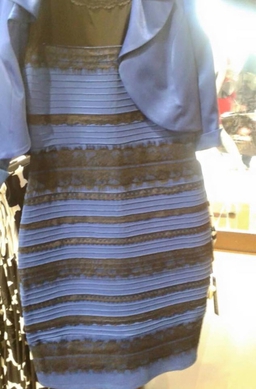Last night I wore what I thought was a grey sweater to the church, but when I walked into the chapel I gasped and said, "Oh, my goodness! This sweater is blue!"
"Yeah?" Rachel said. "It's always been blue."
"I thought it was grey!"
"I mean it's kind of grey, but definitely blue. It's a blue-ish grey, but I've always thought it was blue."
"Huh. I just always thought this sweater was grey..."
It was a little unsettling to suddenly realize I'd been seeing my sweater wrong this whole time.
We—people—know that perceptions differ. There are several examples where people have debated the colour of photographs of various clothing items (a rather mundane thing to argue about, and yet...our perception is important enough to us that we will enter online debates about it).
Is the dress black and blue, or white and gold?
Are these shoes pink and white or teal and grey?
"Teal and grey! Teal and grey!" Alexander just said, reading over my shoulder.
But I can't unsee pink and white (unless, as I did just a minute ago, I leave my computer and see the picture from a distance (I had to go find nail clippers to fix one of Phoebe's nails).
"What?!" he said. "But I see teal and grey!"
Indeed. We see something different in the very same thing.
People also understand and/or interpret situations differently—and defend those positions rather fervently. But you'd think (at least, I'd think) that we'd be hesitant to hold our own views as sacred—or even accurate—when we know that we're fallible. To be honest, I'm altogether unsure of myself about 99% of the time. This was one of the biggest criticisms of my thesis: that I seemed afraid to make any big statement about my findings. And I was like, "This...is...true..."
I could be right. I could be wrong. I could be right and wrong.
I could feel right, but be wrong. And if I determine that I was wrong and change my mindset to account for that shift, how can I be certain that what I feel is right now is right? You know?
Perhaps this is not a quirk that everyone has, but I think that to some degree people must know that perceptions differ (re: the memes above). I probably take it to a whole new level...having avoided choosing "favourite" things since I was about seven years old and realized that...people's favourite colours change (so why have them) and that declaring you have a favourite something (such as a favourite animal—mine was cats) locks you into that for years. It can be difficult to communicate a shift in "favourite" and it may be difficult for others to accept your change.
So I just...like what I like when I like it...and have no favourite colour or animal or season or book...
*****
Meet Nancy.
Nancy is a pink cat that I got for a birthday or Christmas present years ago. I named her Nancy because that is the best name (and I'm unwilling to be wrong about that, so it must be right).
I'm not quite sure when I got Nancy, but I know I had her by kindergarten. It's safe to say that she's been in my life for at least 33 years (if not 35). And she has always been my pink cat named Nancy.





I would not take Phoebe too seriously: after all, doesn't she call a sheep Kitty? Also, Josie told me about these glasses or something that let you see the way that dogs and cats see, and some people noticed nothing different because THEIR vision is abnormal for people. And also what is normal? I wonder, the older I get, whether there IS no normal. Just a whole bunch of different perceptions.
ReplyDeleteThat *is* true. She does have a mountain goat named Kitty. So what does *she* know?
DeleteInteresting about the glasses. I'll have to look into that article.
And I think you're right; this post was another where I wasn't writing precisely about what's in my heart (and instead was writing *around* what's in my heart). And it is that there is no normal, that we all see things the way that we do...and there's no point in yelling about it (because yelling about things has very rarely changed anyone's mind).
I've struggled my whole adult life with imposter syndrome. It's only been recently (maybe because I'm in my forties and can finally admit my own 'adultness') that there are some things (very few) that due to my education and experience that I can speak to as an authority. I know that I am not THE authority but I can certainly speak with more authority than a lay person. I'm sure that the same could be said of you; you are much more an authority than the average person (at least regarding some things).
ReplyDelete